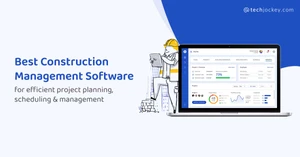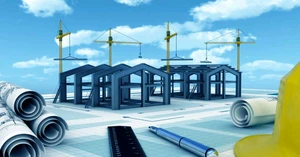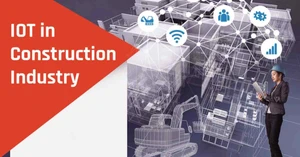Construction ERP Software in India: An Overview
Construction ERP software is designed for contractors, builders, and the real estate industry. It helps to automate the construction process and save time and increase productivity. It is easily integrated with the existing systems. Construction ERP manages 11 major problems on one hand.
Key Features of Construction ERP
- Purchase
- Accounting & Payrolls
- Billing Invoicing
- Inventory Management
- Material Management
- Vendor Management
- Order Management
- Project Management
- Taxes & Statutory Year-End Financial
- Human Resource Management
- Reports & Dashboard
The Need for Construction ERP Software
The construction industry is the pillar of a moving economy. New roadways, commercial and residential buildings, bravura architecture, etc. are coming up every day, thanks to the construction industry. However, to ensure quality in every construction work, companies need to sweat day and night. But, the business approach is changing rapidly as more and more companies are incorporating construction ERP software to relieve their pain areas. Difficulties that construction business encounters are poor productivity and profitability, project performance issues, skilled labor shortage, and sustainability concerns. Construction ERP software assists a business in getting over these challenges efficiently.
Benefits of ERP in the Construction Industry
In today’s fast-moving world, everything is progressing rapidly and much of it depends on the smooth functioning of the construction industry. But even a construction business can face challenges, which are streamlined with the help of construction ERP software. For the effective development of projects, such companies rely on strategic planning and management of resources. A construction ERP software helps a manager in the process of formulating a plan for a civil engineering project.
These are some of the other prominent benefits of construction ERP software Modules
1. Assimilation of data: Within an organization, there are several departments, which work simultaneously and generate information that gets stuck in various departmental silos. A construction ERP software integrates all the operations, thus eliminating the silos and storing the information in a centralized system that can be accessed for getting comprehensive information on all ongoing processes. The benefits that a construction business derives from a construction ERP software are dynamic analysis of financial and operational data. This helps a manager fetch real-time data that is precise.
2. Planning and analysis: Proper planning is a business necessity, be it for the construction industry or any other. An improper plan leads to untimely completion of projects; resulting in loss of clientele and excessive cost burden due to increased labor costs. Apart from the revenue loss, project delay also affects the goodwill of a company. A construction ERP software provides an accurate analysis of the required raw materials, labor required, and architectural design for effective and desirable management of resources.
3. Streamlining of data: Construction companies handle more than one project at a time. With the help of a comprehensive construction ERP software, such companies can track, handle, and store data related to different projects in a centralized system. Thus, the Best ERP software for the construction industry streamlines the flow and data storage.
4. Increased System Efficiency: With the assistance of construction ERP software, information can be accessed easily and quickly before decision making. ERP software for the construction industry helps employees correlate information from variegated sources. Without ERP software for the construction industry, interdepartmental correlation and sharing of information would not be possible. Real-time exchange of information and monitoring of ongoing processes increase the efficiency of organizational systems.
5. Estimation of Construction Cost: Almost every construction company works on a contractual basis. Before acquiring the tender, a construction company has to bid on the project with a cost estimation of the entire project. Different clients have different preferences; they choose a bid based on the submitted design, goodwill of the company, and most critical, the cost feasibility. Therefore, effective and strategic planning of costs is an essential part of a construction business to stay afloat in the industry. Thankfully, ERP software for the construction industry can be utilized for an accurate estimation of the cost of a project.
6. Diversity of Business Processes: A comprehensive construction ERP software consists of various modules that automate different operations within an organization. The industry is becoming more and more conscious about devising strategies for cost-effectiveness and risk management. In this endeavor, they largely benefitted from ERP software for the construction industry. A construction ERP software with its diversified modules helps in effectively managing various operations such as project phasing, inventory management, architectural design, HR management, contract management, marketing, accounting, and financial management.
7. Execution of Marketing Strategies: The objective of any company in the construction business is to deliver quality products and gain a large number of reliable clients. In the absence of construction ERP software, contractors would struggle to manage various operations effectively. They would also face difficulty in effectively implementing marketing strategies to manage customers, projects, etc. For a company to stay afloat in the construction business, concrete marketing needs to be created with the use of ERP software for the construction industry.
8. Job costing/estimation: This is the core function of any state-of-the-art ERP software for the construction industry. Construction projects; whether internal, external, renovation, or other developmental projects, all begin with some sort of cost estimation. Elements such as time and material tasking, overall cost estimation, job-based category management, variable cost estimation, comparison between actual and estimated cost, and more can be managed with ERP software for the construction industry.
9. Flexible accounting: Apart from the typical functions, construction ERP software must provide a granular approach to financial management. A sophisticated construction ERP software consists of modules for contract management, contractor indexing, materials management, equipment management, time and billing, taxes and state/federal policy, operational inventory management, and more.
10. Granular payroll capabilities: ERP software for the construction industry also supports the payroll feature and streamlines functions such as real-time payroll processing, labor costing, summary labor cost analysis, unit cost reports, unit productivity reports, direct labor cost control reports, tax, insurance, EEO reporting, etc.
11. Materials and equipment handling: A construction ERP software must ensure smooth handling and maintenance of construction equipment, such as specialized engine-powered hand tools, bulldozers, earthmovers, dump trucks, water trucks, road graders, asphalt trucks, etc.
12. Comprehensive financial reporting: Financial reporting is essential for business managers; it enables them to make informed decisions based on comprehensive financial reports. An advanced ERP software for construction business must provide a real-time view of a company’s financials. Besides generating a financial report, the construction ERP software should also provide maximized resource utilization analysis on a multi-company and multi-location basis. ERP software for the construction industry should also provide Profit & Loss reports by unit, location, and product mix.
Features of a Construction Management Software Solutions
Implementing ERP for Construction Industry is easy with SaaS tools developed to manage the day-to-day operations. ERP software System for the Construction Company comes with specific modules to make everyday operations smoother. These are some of the features that must be there in ERP software for the construction industry.
1. Purchase Management: The procurement solution or purchase of raw materials is one of the core functions of any construction company. An ERP software for the construction industry ensures comprehensive purchase management through control over purchase orders, vendor payment, procurement process, cost accrual, etc. The best construction ERP software also provides a separate module for streamlining processes and purchase cycle, order closing and cancellation, quality checks, etc.
2. HR & Payroll Management: These days, a growing number of SaaS tool developing companies are integrating the HR management module in the ERP software for the construction industry. This can help the HR department of a construction company in getting rid of the large amount of paperwork and manage employee data efficiently. The HR module also includes an employee portal that makes it easier to store and access employee data.
3. Tender and bid management: The construction industry is diverse and highly competitive at the same time. In such a circumstance, accuracy and speed of bid estimation are crucial for a company to secure a project. A reliable construction ERP software helps a firm in effective and efficient tender and bid preparation.
4. Inventory management: A sound inventory management solution module ensures that the supply chain and financial health of a company remain in check. Construction ERP software helps in maintaining sufficient stock in the warehouse. Essential components of inventory management are maintaining an optimum level of stock, managing materials rejection, quality control based on set parameters, sub-contracting, etc.
5. Financial management: construction ERP software studies and analyses the financial components of a business. It helps in compiling comprehensive financial reports that support decision-making. Construction ERP software should also empower the managers with real-time reports on the financial standings of a company.
6. Engineering: This feature of the ERP software for the construction industry is designed specifically to manage staff work and engineer projects that require approvals and reviews. The ERP software for the construction industry provides flexibility to accommodate vast projects and ensures access to critical information. The software is designed to support unique requirements during the development process.
7. Sub-contractor payment: This feature of ERP software for the construction industry helps manage subcontractors during the entire project. ERP software for the construction industry allows individual managers to effectively communicate with the subcontractor from any time and anywhere. The construction ERP software is effective while managing projects of different sizes and scales.
Construction ERP software is an innovative approach to streamlining operations and bringing about efficiency. Choosing a construction ERP software can be a tough task; therefore, we have listed things you should look for in an ERP software for the construction industry. These days more companies are adopting this revolutionary solution to stay ahead and lead the competition.




















